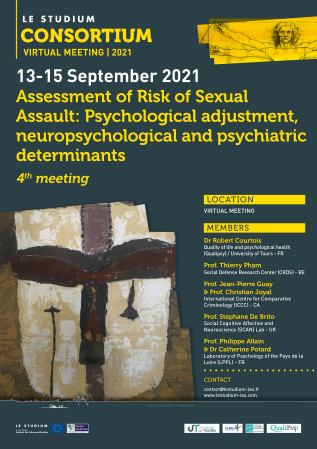Assessment of Risk of Sexual Assault: Psychological adjustment, neuropsychological and psychiatric determinants
4th meeting
VIRTUAL MEETING
France
Presentation
MEMBERS
- Dr Robert Courtois
Quality of life and psychological health (Qualipsy) / University of Tours - FR - Prof. Thierry Pham
Social Defense Research Center (CRDS) / University of Mons - BE - Prof. Jean-Pierre Guay
International Centre for Comparative Criminology (ICCC) / University of Montreal - CA - Prof. Christian Joyal
International Centre for Comparative Criminology (ICCC) / University of Montreal - CA - Prof. Stéphane De Brito
Social Cognitive Affective and Neuroscience (SCAN) Lab / University of Birmingham - UK - Prof. Philippe Allain
Laboratory of Psychology of the Pays de la Loire (LPPL) / University of Angers - FR - Dr Catherine Potard
Laboratory of Psychology of the Pays de la Loire (LPPL) / University of Angers - FR
Description
Sexual violence is a major and growing public health problem across the world. Broadly speaking, sex offending is defined as crimes involving sex, including rape, molestation, sexual harassment and pornography production or distribution. Evidence shows that sexual violence is not inevitable, but can be prevented through approaches that have demonstrated measurable impacts in the reduction of sexual aggression, including recidivism. This serious public health problem has empirical and quantifiable risk factors and intervention points and, most importantly, can be prevented.
Sex offending prevention efforts need to be highly multidisciplinary and inclusive beyond the traditional health fields; focus on both psychological and neuropsychological vulnerabilities; and employ partnership and global cooperation. Better understanding of the different determinants of sexual aggression is an important topic for research, and participation in early detection and intervention for people at risk for engaging in abusive sexual behavior is a key priority. Effective evaluation of sex offenders is needed to reduce the societal impact of sexual crimes, and to assess the level of harm caused to victims.
The mission of the Consortium is to advance knowledge concerning psychiatric, psychological and neuropsychological vulnerabilities and its assessment both in (i) the prediction of sexual assaults and (ii) the risk of recidivism of sex offenders. More broadly, the Consortium aims to promote international exchange of knowledge and an international research network.
The Consortium for Research on ‘Assessment of Risk of Sexual Assault’ (ARSA) consists of five core members and two collaborators working in six institutions located in different regions of the world (France, Belgium, Canada and United Kingdom). All foreign team members have a strong record of accomplishment as applied researchers in the field. The main objective of the Consortium is to study the capacity of individual factors (lifestyle, cognitive distortions, and personality, neuropsychological and psychiatric factors) to predict sexual assaults and recidivism of sexual offenses. The Consortium aims to identify empirically supported factors of sexual aggression in order to develop prediction models (predictive risks and protection factors) and to provide guidelines for prevention programs. In order to reach these goals, it mobilizes a multidisciplinary team with complementary skills. French researchers are keen to catch up in this area and to compare the data they are collecting with international data. All the Consortium’s members wish to develop a common research project in order to respond to a French tender such as the ANR (National Research Agency) or to an international tender (European or French-Canadian).
After reviewing the literature and collecting data on sex offenders, the Consortium will develop a framework on Assessment of Risk of Sexual Assault and propose a set of practical guidelines for research and professional practice in this area. Another goal of the Consortium is to stimulate intellectual inquiry and to set up research partnerships.
Programme
Lundi 13 septembre
14h- 18h30 :
- Réponse à l’AAP ORA
Mardi 14 septembre (14h-18h30) :
- Echange avec Monsieur Tarik-Alexandre Ali-Benali, nouveau coordinateur des CPCA (centres de prise en charge des auteurs de violences conjugales)
- Poursuite des échanges : AAP ORA ou préparation ANR FRIDA
- Echange avec Samuel Guérin, directeur de l’Association Montjoie concernant des enjeux de recherche et l’accès à des jeunes pris en charge en CEF (centre éducatif fermé) – en lien avec l’étude FRIDA
Mercredi 15 septembre (13h- 18h30)
- 13h15 – 13h45 : Echange avec Stéphane de Brito, Pr Matthias Bucher (Fac de médecine de Tours), assesseur aux relations internationales et à l’origine d’une convention de collaboration avec la fac de médecine de Birmingham, Wissam El Hage et Germain Rousseau (bureau des relations internationales de l’Université de Tours) en vue d’étendre cette convention à la psychologie et aux neurosciences)
- 14h à 15h : Echanges sur leur travail de thèse en psychiatrie avec deux internes : Husain Al-Awadh (fantasmes et relations coercitives) et Hélène Estepa (dissociation et personnalité antisociale /psychopathie). Présence possible de Lindsay Gosselin (début de thèse en cotutelle Tours, Mons, codirection par Catherine sur Traits de psychopathie et violence conjugale)
- 16h : Echange avec Mr François Kraus, Directeur du pôle « Genre, sexualités et santé sexuelle » de l’IFOP (Institut d’études opinion et marketing en France – en lien avec Dynata) : 1ère partie de l’étude pour FRIDA)
- Poursuite des échanges : AAP ORA ou préparation ANR FRIDA
- En dehors du travail sur RDOC et pédophilie à poursuivre, réflexion sur les autres suites à donner au Studium Consortium, dont c’est la dernière rencontre
Partners of the event







